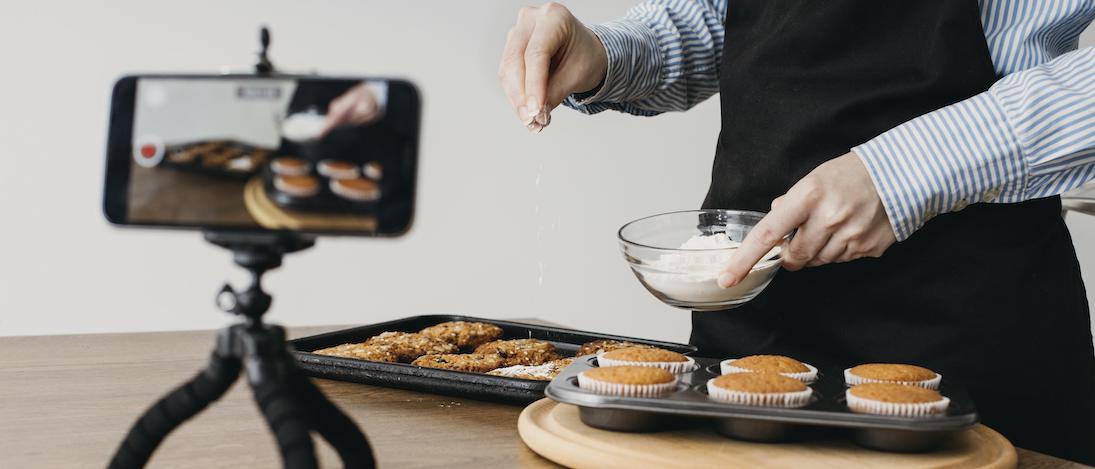Date published: 24.03.2021
Less time in stores, more time online: how to influence consumers in 2021?
With the Covid-19 pandemic, British consumers have taken on new habits, anticipating their grocery shopping and limiting the time spent in-store. At the same time, digital, which was already very present in our lives, has become even more important. In this context, what are the levers to influence consumer behaviour and encourage the discovery of new products? Here are some ideas and initiatives that brands have put in place to appeal to consumers in this new environment.
Faster and more efficient shopping
According to the Deloitte Global State of the Consumer Tracker, only 53% of British shoppers feel safe in stores. As such, consumers in general are spending less time in stores as shown by a global study conducted by Mood Media. No more lingering in the aisles to discover new products, time spent in store is being minimized to limit health risks.
Scott Moore, Global Chief Marketing Officer at Mood Media, explains:
“Many consumers are spending less time in store and less money per visit, meaning they’ve become mission shoppers focused on getting in and out as quickly as possible.”
As such, the vast majority of consumers use a shopping list, planning what they will buy in-store beforehand. During the first lockdown, 88% of British shoppers were using a shopping list according to a Shopmium survey. The growing number of shopping list apps illustrates this trend.
Many British households are also cooking more since the onset of the pandemic. Food has become even more central in people’s lives and, as such, consumers tend to anticipate their meals, look for recipes online and purchase ingredients in advance. A survey we conducted at the end of 2020 shows that 62% of us cook more meals from scratch than we did before the pandemic.
Greater use of social networks
If consumers used to discover new products in stores first and foremost, social networks are playing a growing role. And, with the lockdown measures and restrictions, the British are spending more time online and on social networks. According to the ‘we are social’ and Hootsuite 2021 Digital report, the average time spent online in the UK in 2020 was 6 hours and 26 minutes per person per day, of which 1 hour and 49 minutes on social media. 53 million Brits are active social media users (77.9% of the population). For brands, appealing to consumers online, before they shop in stores, has become critical.
Influencer marketing is an effective way to stand out on social media networks and reach a large number of consumers. At Shopmium, we have helped various brands boost their visibility in 2020 with our social amplification platform, allowing them to establish partnerships with influencers and micro-influencers.
We for example supported Cafédirect, with recognised foodie blogs such as Anna Banana and Elizabeth’s Kitchen Diary (15k followers on Instagram) publishing an article on their trial of Cafédirect ground coffee. We also partnered with Tilda, with influencers Elizabeth’s Kitchen Diary and Little Sugar Snaps (3.4k followers on Instagram) creating their very own recipes with Tilda rice.
More and more brands are also trying their hand at TikTok, which gained many users in recent months. The mochi brand Little Moons successfully leveraged TikTok to create awareness and engagement with a young audience as outlined in a TikTok case study. Ross Farquhar, Marketing Director at Little Moons, shared:
“TikTok has catapulted our mochi ice cream into being the UK’s must-have food of 2021. Seeing the British public go to ‘Big Tesco’ in search of Little Moons in their thousands, and the videos they created being viewed over 100m times, has been incredible and we’re all now focused on getting as much stock out and shelves filled as we possibly can.”

The growing popularity of video games
Another big winner of the pandemic are video games, which have recruited many new fans. The ‘we are social’ and Hootsuite 2021 Digital report shows that 74% of Brits aged 16 to 64 play some kind of video game on a smartphone, computer, game console, tablet or another type of device.
Video games have become a new playground for brands to experiment, increase their visibility and boost their attractivity. Pringles for example is heavily invested in video games, through partnerships with Xbox and with specific programs targeting gamers. The brand recently decided to go even further and launch a campaign in a video game directly.
In January 2021, Pringles announced the co-creation of a new character in the popular game West of Dead. For the launch, the brand partnered with Leah Viathan, a well-known British gaming influencer and streamer. During one of her live streams, the new character – a zombie named Frank – escaped from the video game into Leah’s living room and grabbed her box of Pringles.
Nicolas Borri, Pringles Marketing Director, explained at the time of the launch:
“We know that video game players love the unexpected and we’ve had a lot of fun creating this fascinating and challenging experience for them. It’s great to see that even Zombie Frank was eager to get his hands on some Pringles.”
An increasingly important criteria: social and environmental practices
While labels and ingredients are a crucial issue, British consumers are also becoming more socially and environmentally conscious, scrutinizing how brands behave. According to Deloitte, 43% of consumers are actively choosing brands due to their environmental values and 34% are choosing brands based on their ethical credentials. Mondelez has been taking charge of these issues through its Harmony Wheat scheme, which aims to sustainably source the wheat used in its products and help farmers improve the methods they use for growing their crops. Its objective is to make its entire biscuit portfolio across Europe with Harmony sustainable wheat by 2022.
The quest for promotional offers and discounts
While many brands are choosing to reach out to consumers where they are – on social networks and gaming platforms – others are relying on special offers to stand out and generate sales.
Many British households experienced a drop in income with the pandemic, increasing their interest in discounts and deals. According to Statista, for around two-third of UK consumers, price is the most important thing when choosing what to buy.
As such, British households are actively looking for promotions, using mobile apps like Shopmium. IRI points out that British consumers are digital ‘infoseekers’, actively looking for information and discounts before they shop. 86% of Shopmium users say they visit the app at home, before going out to the store.

The desire to be entertained
Finally, to appeal to consumers in 2021, some brands are choosing humour. It is clear that there is a strong longing for fun and entertainment. A brand embracing this approach is Yorkshire Tea, which is considered one of the funniest brands on social media.
Marketing Week named its Introducing…The Social Distancing Teapot video one of the best marketing campaigns of 2020. Marketing Week reporters highlight:
“The ‘Introducing…’ ad captured the nation’s longing for some manifest silliness after a year of trauma and confusion. It’s a celebration of the mundanities of office life, of meetings (real ones, in actual meeting rooms), desk space, whose turn it is to get the kettle on – the stuff that all of us have missed but know will quickly be entrenched back into the routines of our daily working lives.”
It is clear that brands that are able to connect with consumers in this unprecedented context will establish strong and lasting emotional bonds.
As a conclusion, if digital was already influencing consumers, its importance has increased with the sanitary crisis. The British have never spent as much time online: to entertain themselves, organize their lives, find new recipe ideas or identify the best promotional offers. Store visits have become shorter and more efficient, leaving less room for improvisation, product discovery and impulse buying.
To seduce consumers in 2021, brands need to go find them where they are: on social media, video game platforms and promotional mobile apps.